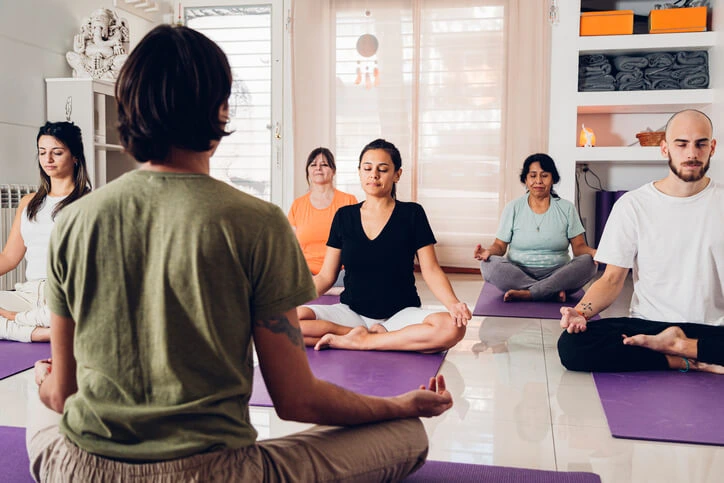How to become a yoga instructor in the UK
01 May 2025

If you’ve ever stepped off the mat after a particularly rewarding yoga session and thought, ‘I’d love to do this every day as a career,’ you’re in the right place. Yoga has boomed in popularity, not just as a way to stay fit and flexible, but as a complete lifestyle. And the great news is that if you’ve got a passion for yoga and a desire to help others, you can turn that passion into a career.
In this guide, we’ll look at everything you need to know – from the skills and qualifications you’ll need to how to start your own yoga business. Whether you dream of teaching in a London studio, running beachside retreats in Spain, or hosting Zoom classes from your living room, we’ve got you covered.
How do I become a yoga instructor? Step-by-step
Step 1: Practice different types of yoga
Before jumping straight into teacher training, you’ve got to be a student first and not just someone who pops into a class now and then. Consistent yoga practice is the foundation of great teaching. You don’t need to be able to do advanced poses, but you should feel comfortable with common yoga sequences, breathwork, and different class styles.
Explore as many types of yoga as you can – Vinyasa, Hatha, Ashtanga, Yin, and even Hot Yoga. This will help you determine the style you might want to teach later on. Not sure which style is for you? That’s ok, discovering your yoga style takes time.
Step 2: Choose the right yoga teacher training course
If you’re researching how to become a certified yoga teacher, you’ll find a common theme: everyone starts with a 200-hour Yoga Teacher Training (200-hour YTT) course.
This is the standard entry point into teaching yoga. It usually covers:
- Asanas (postures) and alignment
- Yoga philosophy
- Breathwork (Pranayama)
- Meditation techniques
- Anatomy and physiology
- Teaching methodology
- Ethics and lifestyle
- In-person vs online courses
Post-2020, you can now find high-quality online yoga teacher training courses. These offer flexibility, especially if you’re balancing work or a family. But in-person training gives you hands-on experience and live feedback, which is hard to beat.
If you’re based in the UK, look for courses that are accredited by Yoga Alliance or the British Wheel of Yoga. These can make it easier to get insured and find teaching opportunities.
Step 3: Get certified and consider getting insured
Once you’ve completed your training, you’ll get your certificate, and you’re officially on the path to becoming a yoga instructor.
But you’re not quite done yet. You may want to consider:
- Yoga teacher insurance: This protects you in case of any accidents or claims during your classes.
- First aid certification: Some studios and venues require this.
- Continued education: After your 200-hour course, you can take additional modules in specific styles (like Yin, Kids’ Yoga, or Yoga Nidra) to enhance your skill set.
You may also find our guides, such as how to clean a yoga mat, useful before you start teaching.
Step 4: Practice teaching
Once you have your certificate, you can start teaching even if you’re nervous or still figuring out what kind of teacher you want to be. Start small: teach friends and family in your garden, offer donation-based classes, or run free Zoom sessions to practice.
Teaching is a skill that grows with time and experience. You’ll find your rhythm, your style, and your confidence through real experience, not just theory. Plus, you'll increase your yoga instructor salary with experience.
Step 5: Pick your yoga teaching niche
One of the best things about becoming a yoga teacher is the variety of paths you can take. You don’t have to teach flowy Vinyasa classes forever (unless you want to).
Here are some of the popular yoga specialities:
- Vinyasa yoga – Dynamic, breath-led movement.
- Hatha yoga – Great for beginners. Slower-paced with more static holds.
- Ashtanga yoga – Structured and challenging with a set sequence.
- Yin yoga – Deep stretching and long-held poses to target fascia and joints.
- Restorative yoga – Very gentle, focuses on relaxation and healing.
- Prenatal/postnatal yoga – For expectant or new mums.
- Chair yoga or accessible yoga – Designed for older adults or those with mobility limitations.
- Kids or teen yoga – Fun, engaging classes for younger yogis.
Choosing a niche doesn’t mean limiting yourself. It helps you attract the right students and build your brand as a yoga teacher.
Step 6: Start teaching professionally
There are lots of options when it comes to teaching professionally, and where you can be based. You can teach:
- At yoga studios (usually freelance)
- In gyms or leisure centres
- At community centres, churches or schools
- Privately (1-to-1 sessions or small group classes)
- Online via Zoom, Instagram Live or YouTube
Be prepared to hustle a little at the start. Reach out to local studios, offer cover classes, and ask to be added to supply teaching lists. The more visible you are, the more opportunities will come. Even teaching one class a week is a great way to begin.
Step 7: Set up your own yoga business
Dreaming of being your own boss? Whether you want to run your own studio, teach online, or travel and run retreats, here’s how to start:
- Register as self-employed: If you’re in the UK, head to the HMRC website to register as a sole trader.
- Get a website and social media: Use Instagram, a simple WordPress website, or booking tools like Momoyoga or Bookwhen.
- Manage your money: Keep a spreadsheet of income and expenses and save for your annual tax return. It’s not fun, but it’s essential.
- Create packages or programs: Consider offering class packs, private session bundles, or online memberships for consistent income.
What skills make a great yoga instructor?
Being a yoga teacher is more than just instructing poses. You’ll also need:
- Good communication: Clear, calm, and confident instruction makes a big difference.
- Empathy: Being in tune with your clients’ needs (physical and emotional) is important.
- Adaptability: No two students or classes are ever the same.
- Creativity: Building engaging sequences and themes keeps things fresh.
- Business savvy: Marketing, pricing, and managing bookings are part of the package, especially if you go freelance.
Don’t worry, you don’t have to have all these skills straight away. They’ll develop naturally over time as you become more experienced.
FAQs
How long does it take to become a qualified yoga instructor?
Depending on the format, a 200-hour YTT can take anywhere from two weeks (intensive) to six months (part-time). After that, you can start teaching, but learning never really stops.
Is yoga teacher training worth it?
Absolutely. Many people say yoga teacher training changed their lives, even if they don’t teach professionally. It deepens your understanding of yoga, boosts your confidence, and introduces you to a community of like-minded people.
How do you become a yoga instructor with no experience?
Start by building up your own practice, then find a beginner-friendly YTT course. You don’t need years of experience, just a passion to learn and share.
Is 40 too old to become a yoga teacher?
Not at all. Many successful teachers start in their 40s, 50s, and beyond. Yoga is about lifelong learning, and older teachers bring wisdom, calm, and experience that students appreciate.
Ready to begin?
Whether you want to teach once a week in your community hall or dream of building a full-time career, you can decide your path. With the right training and commitment (even when you feel nervous about teaching), you can turn your love for yoga into something incredible.
Specialist yoga instructor insurance through Insure4Sport
Before you start teaching your first yoga class, you may want to consider getting specialist yoga instructor insurance. At Insure4Sport, we arrange cover to protect you, your staff, and your studio.
Having specialist insurance in place can protect you if a client claims against you for an injury they’ve suffered in one of your classes and may compensate you if your yoga equipment is lost, damaged or stolen.
Find out more about specialist yoga instructor insurance or get an instant quote today.
Please note the information provided on this page should not be taken as advice and has been written as a matter of opinion. For more on insurance cover and policy wording, see our homepage.
Get a quick quote for Sports Insurance
Get A QuoteRelated Posts
©Copyright Ripe Thinking Limited 2026.
Insure4Sport® is a registered trademark and a trading name of Ripe Insurance Services Limited which is Authorised and Regulated by the Financial Conduct Authority No.313411. Registered office: One Stockport Exchange, Railway Road, Stockport, United Kingdom, SK1 3SW. Registered in England No. 04507332.
